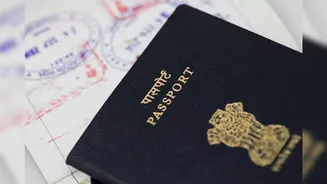When you enter a country on a tourist visa (or visa-waiver/visitor permission) you’re given a legal window to stay, which is most often a number of days
or until a specific date. If you remain past that permitted date or period, you are considered an “overstayer.” Even if it’s just a few days, many countries treat it as a violation. For example, the U.S. Embassy in India reminded travellers: “If you remain in the United States beyond your authorised period of stay, you could be deported and could face a permanent ban on travelling to the United States in the future.”
Can You Get Jailed For Overstaying Your Visa?
Here are some concrete cases that show the consequences in action.- In 2025, one Irish tourist overstayed his visa waiver by just three days in the U.S. He was detained by immigration authorities, held in custody for more than 100 days, and eventually deported with a 10-year ban on re-entry.
- In India, a 27-year-old woman from Uganda was arrested in Bhopal after her visa had expired (in 2022) and she was found using forged documents to rent a house.
- In Saudi Arabia, the government introduced a new rule: visitors whose visa has expired may be granted a 30-day exit permit via their digital platform but if they stay beyond that, steep fines, jail time (up to 6 months) and re-entry bans apply.
What Happens If You Overstay Your Tourist Visa
Here are the major repercussions you should be aware of:Fines and Financial Costs
Many countries impose monetary penalties for overstaying. For example, if you overstay in India on an e-visa, here is what the government mandates:- 0–15 days overstay: no fine (but still a mark on record)
- Over 15 days but less than 30: ₹10,000 fine
- Over 30 but less than 90 days: ₹20,000 fine
Detention, Deportation & Exit Enforcement
If caught, you may be detained by immigration authorities, held in a facility, and eventually deported. The U.S. and other countries often treat overstayers as “unlawful presence” which can escalate quickly.Entry or Re-entry Bans
One of the most serious outcomes: your visa overstay can trigger a ban on returning to that country (or sometimes many countries) for a set period or even permanently. In the U.S.:- Overstay by > 180 days but < 1 year: 3-year ban
- Overstay by ≥ 1 year: 10-year ban
Future Visa Applications Suffer
With an overstay on record, any future visa applications (even for different countries or purposes) are far more likely to be rejected, subject to extra scrutiny, and you may be required to provide much more documentation.Loss of Legal Status & Rights
Once you’re unlawfully present:- You lose the authorised visa status
- You may lose the right to change status or switch visas within the country
- Travel insurance may become void
- You are vulnerable to removal without usual protections.
Why This Happens & Why You Should Care
- Ease of forgetting the date: Many visitors miscalculate or overlook the expiry.
- Emergencies happen: Illness, travel disruptions, delays may cause you to overstay, but immigration rules rarely excuse simple delays.
- Global sharing of data: Immigration systems are increasingly digital and interconnected; one overstay can follow you for years.















